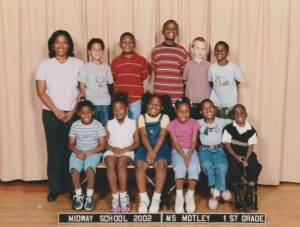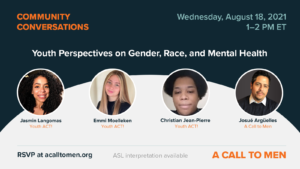Back to School — Centering Equity in Challenging Times
This time of year always has me thinking back to the 20 years I spent teaching. I would contemplate the year ahead — who my students would be, how I could teach the tough concepts, where I could get supplies for students (who often couldn’t afford them), and, of course, when the breaks occurred in the calendar.
My, how times have changed.

With a new school year already underway for many, and approaching for others, I’m hearing from educators (as well as parents and students) a sense of deep concern about another very difficult year.
On top of the classic teacher concerns, the last fourteen months have brought on a different kind of anxiety. Teaching during the pandemic means negotiating vaccines, variants, and masks. Teachers are juggling remote and in-person lesson plans, evaluating and managing the mental health of their students (and themselves), the increase in aggression and bullying on digital platforms, and promoting inclusion and equity during a time of immense change and challenge.
Amidst the pandemic, it’s more important than ever to center equity for ALL educators, students, and families. Covid-19 has exacerbated disparities across our education system. Many working-class families are less able to miss work to support hybrid schedules. Additionally, Black and Brown students are less likely to have access to the best technology. Asian American, Pacific Islander students are facing waves of increased discrimination. Students with exceptionalities have faced regression due to lack of access to support services which enable equitable learning. Queer, trans, and nonbinary students are at increased risk of abuse and isolation at home. Finally, most students have faced some challenges to their mental health as well due to the impact of the pandemic.
If you’re an educator, you’re probably thinking this is not what you signed up for. There is so much to handle. How do you manage your own mental health in the midst of caring for your students? And what about your own families? How do you balance it all?
Despite the many challenges, educators are still showing up and doing the work. I couldn’t be more proud of the way you all display creativity, flexibility and compassion in the midst of these tough times. And I am so grateful to the educators — teachers, assistants, administrators, school board members, and so many others — who are going the extra mile this year to continue working to advance gender and racial equity in our schools.
The best teachers are usually those with the best support system. We at A Call to Men want you to know that we are holding you in our hearts for the upcoming school year and promise to do what we can to help you navigate the way forward. We can’t stop the Delta variant, but it’s on all of us to do what we can to make sure our young people have access to a quality education — with safety and equity at the core.
Below is a collection of the resources we offer for educators as we return to school — we hope you’ll find them useful, and we’re looking forward to continuing the conversation in upcoming sessions.
Elementary and Middle School
 Boys are confronted with terms like “toxic masculinity” and “male privilege” and the headlines are dominated with stories about men behaving badly. But being a boy is a wonderful thing. To make every boy’s lived experience the best it can be, we have to be intentional about encouraging their authenticity, helping them develop empathy, educating them on healthy relationships, promoting emotional literacy, and supporting social-emotional learning. If you are a teacher of boys in grades K – 8, The Book of Dares: 100 Ways for Boys to be Kind, Bold and Brave is the answer. What’s even more exciting is that it comes with a free discussion guide (With all of the things teachers have to purchase at the beginning of the year, who doesn’t love a freebie?). The guide includes an overview of the book, some tips for using the book with your students, and discussion questions to build on the dares in the book.
Boys are confronted with terms like “toxic masculinity” and “male privilege” and the headlines are dominated with stories about men behaving badly. But being a boy is a wonderful thing. To make every boy’s lived experience the best it can be, we have to be intentional about encouraging their authenticity, helping them develop empathy, educating them on healthy relationships, promoting emotional literacy, and supporting social-emotional learning. If you are a teacher of boys in grades K – 8, The Book of Dares: 100 Ways for Boys to be Kind, Bold and Brave is the answer. What’s even more exciting is that it comes with a free discussion guide (With all of the things teachers have to purchase at the beginning of the year, who doesn’t love a freebie?). The guide includes an overview of the book, some tips for using the book with your students, and discussion questions to build on the dares in the book.
For all educators, especially those in middle- and high schools I can’t recommend highly enough that you download our free Live Respect curriculum. It’s a set of easy-to-implement lessons and tools for grades 6 – 12.
High School
At the high school level, an essential element of all equity work is centering the voices of young folks. At A Call to Men, we’re committed to ensuring that the next generation of leaders has the tools, training, and resources to make giant leaps in the pursuit of intersectional equity. That’s why we’re hosting a series of trainings and conversations through the fall aiming to amplify the voices of youth.
Wednesday Aug. 18th from 1-2 p.m. ET — Our free, online community conversation will feature leaders from YouthACT! (the teen advocacy council we help to facilitate) sharing about the issues facing teens today and ways young folks can use their platforms to create lasting change in their schools and communities. I can’t wait to go deep in conversation with these incredible young leaders. RSVP to join us »
We are also working with Youth ACT! to offer a series of essential one-hour workshops for schools and youth groups. Topics include: Breaking Out of the Man Box, Upstanders Against Anti-Blackness, and Selfies: Looking In at Your Mental Health.
And, finally, we are offering a free session of our signature Institute for Gender & Racial Justice exclusively for high schoolers on October 20, 2021 from 5:30 — 8:30 p.m. ET. Learn more and RSVP (this one will fill fast) »
Colleges and Universities
For college leaders, administrators, educators, and students — we have a few seats left in our custom institute next week — Monday and Tuesday August 16 & 17. Our Training Institute will help you create meaningful impact in your work and allyship practice. We’ll facilitate deep discussion about how white supremacy, trauma, erasure of Indigenous Peoples, and anti-Blackness negatively impact all of humanity and more.
The challenges of this past year are far from over and there could be more difficulties ahead. However, if we keep the focus on listening to our students, amplifying their voices, empowering them to address the “tough stuff” and extending grace to them and ourselves, we can create a more equitable learning environment for all of our students.
How will you be a part of the movement?

